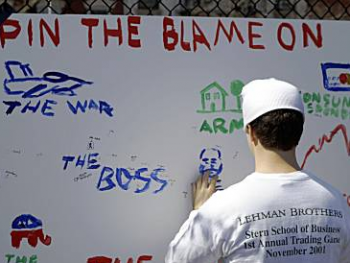Woman Burns Toast
Tony Blair’s wife set off the smoke detector in a breakfast mishap this weekend. Just thought you should know.
Millions of Colds, Staph Infections, Deaths Traced To Apple Stores

– PR NEWSWIRE, FROM JAMA, APRIL 5, 2010: Literally 1 in 200 Americans reported illnesses, strange fungi, odd growths and various hacking coughs after visiting the iPad in its native environment of the Apple Store this weekend. The grubby filth magnet devices, pawed by the elderly and the young alike, were consistently 140% grosser than dollar bills in a taxi cab, scientists reported. While 300,000 were sold on Saturday, the rest remained on those tidy little Apple tables, to infect more visitors with left-behind skin contagions and bits of tween drool-phlegm. No but seriously, my favorite part of The Ritual Visiting of the iPads was the 8-year-old who said to his dad, “See, it’s even got Microsoft Word” as he opened “Pages.” [Photo by Robert Gaal.]
TOB Ends
The Morning News’ Tournament of Books has wrapped up for the year, and it went down to the wire. I chose Hilary Mantel’s Wolf Hall as my winner, but if you’re interested I also highly recommend the other finalist, Barbara Kingsolver’s The Lacuna.
The People Who Screwed You Out of Unemployment

When it comes to the market order, there’s oversight and then there’s oversight. Just consider the evidence offered up in Sunday’s New York Times, which points up what any casualty of our job-starved economic recovery has long known: that the quotient of vigilance your particular grievance inspires depends on where you fall in the social hierarchy of the workforce. Over in the A section, Times reporter Jason DePaerle surveyed the track record of the St. Louis-based firm Talx, which a host of major US companies, from Wal-Mart to the US Postal Service, retain to contest unemployment claims filed by the cashiered class.
Talx is for some reason pronounced “talks,” though as DePaerle makes clear, the firm’s chief product is pretty much the antithesis of direct communication. Brought in to review as much as 30 percent of pending jobless requests, Talx dispatches third-party agents to mire the claims process in incomplete paperwork, absentee board-review hearings, and in some cases, outright fabrications. The tactic has become so widespread, DePaerle reports, that Iowa and Wisconsin have passed laws to crack down on Talx-style delaying tactics-while the New York Labor department now instructs its officers “to side with workers in cases that simply pit their word against those [sic] of agents for employers.”
The particulars of Talx-brokered claims disputes make a strong case for a much broader culture-wide shunning of these paperwork Pinkertons. Agents of the firm misrepresented a claims call involving Gerald Grenier, a mentally impaired Wal-Mart janitor fired for absent-mindedly neglecting to return a few dollars’ worth of change he’d pocketed from a vending machine. Wal-Mart failed to show up at a hearing the janitor got scheduled three months after his unemployment claim was denied-and a Talx agent was heard hanging up during Grenier’s testimony on a follow-up conference call hearing. Even then, the firm went on to challenge Grenier’s vindicated claim, falsely asserting that the New Hampshire Labor Department didn’t let the Talx agent testify by phone. Grenier eventually had his benefits reinstated, but not before he lost his apartment and was forced to move in with his sister.
Talx’s dilatory business model is a boon to big firms for the simple reason that the longer benefits go unpaid, employers aren’t forced to pay taxes on them. Already strapped jobless Americans are apt to just give up in the face of a full-court press from claims agents charged with making their cases as difficult as possible to process.
In one especially fragrant Massachusetts case, the company lost its challenge to benefits claimed by an employee of the epically unsound (and now bankrupt) mortgage giant Countrywide Financial when its agent failed to show at a hearing. The agent claimed that the blown appointment was due to a death in the family-a claim later recanted when probed under oath before a Salem district judge. There’s a nice origami-like structure to this entire set piece: a financial concern decimating the housing market with grotesquely unsustainable mortgage deals (indeed, the defendant, Linda Greiss, successfully alleged that Countrywide’s very business model constituted an unsafe working condition due to the attention it drew from federal investigators in 2008) hires on a claims advocate to pump the system with petty lies insulting to that agent’s own family life. And they say the spirit of American entrepreneurship is on the ropes!
The gruesome Talx track record makes for edifying reading alongside yet another mammoth Timesian breakdown, in Sunday’s business pages, of efforts to curb excessive executive compensation. True, reporter Devin Leonard notes that CEOs saw a 15 percent decline in their pay packages in 2009-largely under the pressure of Kenneth Feinberg, the Obama White House’s “compensation czar,” who approved a $500,000-a-year ceiling for the heads of companies receiving support from the Troubled Assets Relief Program.
But that decline represents an average figure, and when it comes to the way that firms go about crafting compensation plans, outliers abound. Yes, corporate boards are trimming outright cash outlays for CEOs, but those executives still rake in plenty via deferred stock plans and other sweetheart arrangements with favored corporate leaders. So that, for instance, when the CEO of Starbucks high-mindedly wrote down his salary from $1.9 million to $6,900, citing the overall sluggishness of the economy, his friends on the board shook loose a $1 million “discretionary bonus” for the company’s solid 2009 performance.
Hewlett-Packard CEO Mark V. Hurd has scored discretionary bonuses three years running-which landed him the No. 4 spot on the Aquilar annual survey on executive compensation this year with a cool $24,000,000, even though he made a show of reducing his nominal cash salary by 20 percent. Lawmakers are weighing a “say on pay” provision in pending financial reform legislation, which could permit corporate shareholders to vote each year on executive compensation plans-though it’s far from clear that such votes would be binding on corporate boards, even should the provisions clear Congress. “I think say-on-pay is pointless,” University of Delaware corporate governance professor Charles M. Elson told the Times, citing the propensity of most boards to devise workarounds that sidestep high-profile pay strictures.
Indeed, last year’s highest paid banker, John G. Stumpf of Wells Fargo Inc., came into his $19 million payday by hewing to the letter, if not the spirit, of Feinberg’s compensation plan. The California banking conglomerate received TARP funds, which it repaid in December, so it structured Stumpf’s cash payout at a comparatively modest $900,000. But the Wells board also gave him $4.7 million in annual stock issues-plus, oh, what the heck-another $13 million in stock on top of that, in part due to Wells’ TARP-orchestrated acquisition of flailing east coast banking giant Wachovia.
All of which suggests that the federal push to restructure top dog compensation could use a dose of innovative thinking. Surely there must be some reality TV franchise out there that could arrange for the Stumpfs and Hurds of the world to put in tours as night janitors at Wal-Mart. Then all you have to do is send them packing at the end of their shifts with a couple dollars in vending machine cash. It would be a vastly entertaining spectacle, as well as a slight incremental gain in cosmic justice, to see them try to get a Talx agent to return their calls.
Ask Roger Hodge: "Is the Post Office Going to Follow the Way of Magazines"?
Obviously I did not watch this entire 35-minute Q&A; with-or the full 25-minute talk by-unemployed non-former Conde Nast (former non-Conde Nast, I mean) magazine editor Roger Hodge, but I did start them both! (The next question from the Q&A;, after the one about the mail, involves the SOCIAL NETWORKS.) The Q&A;, obviously, followed Hodge’s talk at Duke, which was titled “My Rise and Fall,” but only on accident, as Hodge said he actually wanted the talk to be called “Decline and Fall,” which he attributes to the title of a book about the Saturday Evening Post (Otto Friedrich, 1970), but perhaps you know it from elsewhere? Anyway, it happened right after Hodge left Harper’s and Hodge also makes fun of the coming singularity, which, NOT COOL MAN. No one makes fun of the singularity.
How Bill Clinton Made America A Better Place

A new study with the deliberately unsexy title “Sex Redefined: The Reclassification Of Oral-Genital Contact” shows that a mere 20% of college students consider oral sex to be actual sex (98% think good old fashioned doing it falls under that rubric, and 78% say the same about anal, which, you know, I was totally born too late). That’s half the number of college kids who felt mouth stuff belonged in the sex category when asked the same question in 1991. What explains the difference?
Unlike respondents in the previous samples, our respondents were adolescents after the Clinton-Lewinsky era, which our comparisons of data over time suggest may have been a turning point in conceptualizations of oral-genital contact. The dramatic and sudden shift in attitudes toward oral-genital contact can therefore be termed the Clinton-Lewinsky effect.
Or maybe college kids just realized that having someone go down on you is TOTALLY AWESOME and should be an everyday experience that isn’t freighted with your judgey labels. Did you ever think about that, Science? [Via]
Jersey Mayhem: Every Criminal Makes One Mistake
Jersey Mayhem: Every Criminal Makes One Mistake

You know who is not good at stealing stuff? The two Monmouth University students who were charged with car theft in Long Branch, NJ, last week after one of them dropped his wallet, according to police, in the process of stealing a 2009 Audi. They crashed that car at 6:40 a.m. Wednesday, police say, ran from the scene of the accident and then stole another car. When police contacted the owner of the original car, the Audi, and went to the house from where it was stolen, they found the wallet in the driveway where it had been parked. Identification cards in the wallet led them to the Monmouth University campus, where they found the second stolen car. But you know who is good at stealing stuff?
Raccoons.
Malcolm Gladwell Correct!

Oh my God, I think I agree with Malcolm Gladwell? First though we must note that this interview contains a wonderfully telling Gladwell moment. Gladwell says that we need to look at the consequences of social media. Great, can you give me an example, he is asked. And then he pretends to give an example which isn’t an example at all, but a vague theory. Okay but that is a quibble! Because then there’s this. “If I’m putting together a flash mob, that I want everyone to meet me in half an hour in Times Square, it’s really useful to have 100,000 followers on Twitter. If I want everyone to go to my website and buy my new book, it’s incredibly useful to have 100,000 followers on Facebook. If I want to start a political movement to overthrow a tyrannical regime, it may be less useful. If you follow me on Twitter, I do not own your heart. I may own your pocketbook momentarily. And I may own your attention for five seconds, but that’s it.” That’s what’s funny about the demands for a PLATFORM or a BRAND IDENTITY ONLINE for those who make things, like albums or books or macrame: those “social media relationships” just aren’t that deep or durable.
A Farewell to America's Ballpark Organists

“As the unofficial instrument of baseball, the organ makes perfect sense. There’s a sound of laziness to the organ. It’s almost like the speech pattern of someone just waking from an afternoon nap. That sound, that feeling, is baseball in a nutshell. Forget explosions and thundersticks; baseball is a lazy afternoon and a few beers with the buddies or Cracker Jacks with the family. It’s reclining in the sun with 30,000 of your closest friends. The fact that baseball organists are close to becoming extinct is disheartening to many fans.” But not the ones that still get riled by WHO LET THE DOGS OUT?
I Prayed to the Newly-Returned Jesus that Anthony Lane Would Review 'Clash of the Titans' And...
I Prayed to the Newly-Returned Jesus that Anthony Lane Would Review ‘Clash of the Titans’ And Hooray!

Clash of the Titans “stars Sam Worthington, but you will have guessed that already. These days, no major production is allowed to embark without him. He is the strapping Australian lad who, without warning, has found himself cast as a cyborg, in ‘Terminator Salvation,’ as a would-be alien, in ‘Avatar,’ and now as the demigod Perseus, in ‘Clash of the Titans,’ while retaining the look of someone who cheerfully expects to be returning to a steady job on a building site.” EXACTLY! EXCEEDS EXPECTATIONS! A++! WOULD DO BUSINESS AGAIN!
